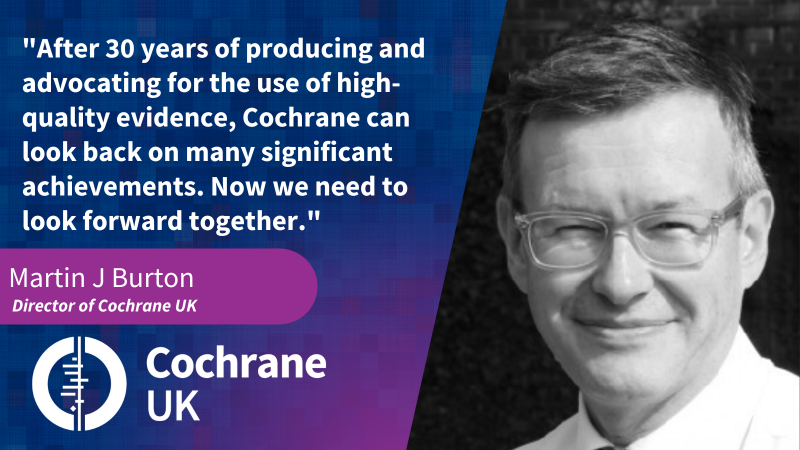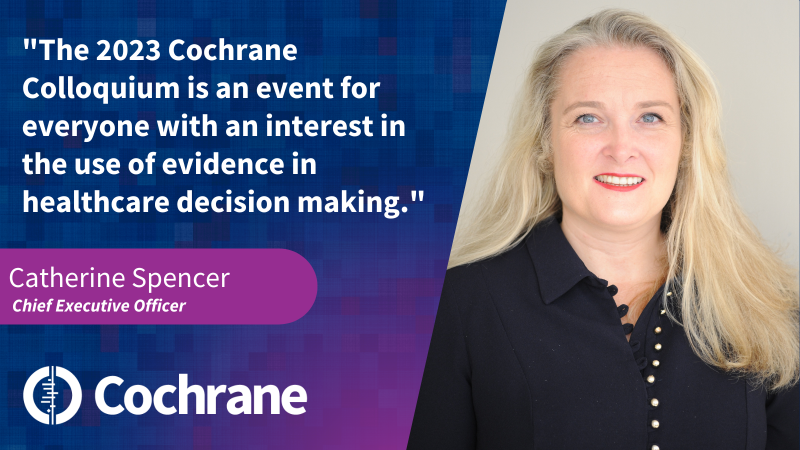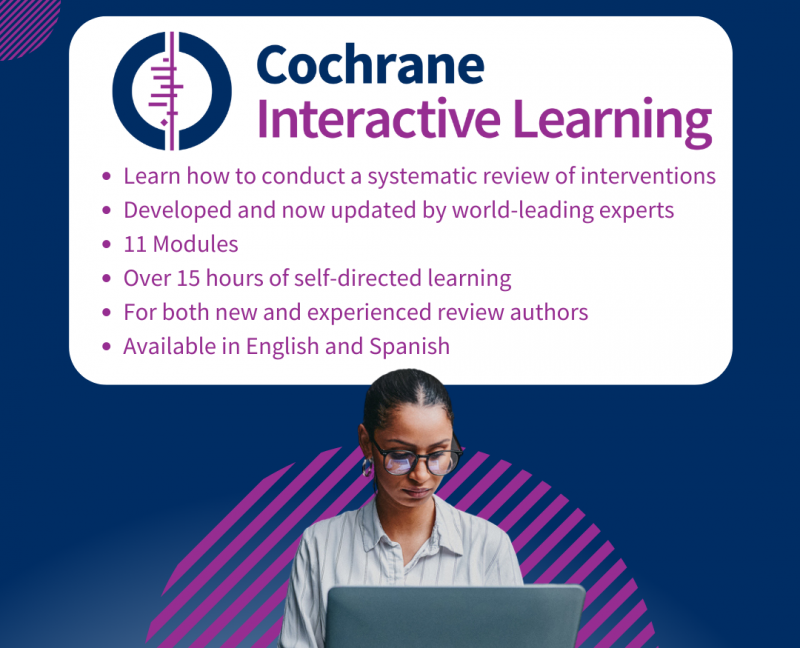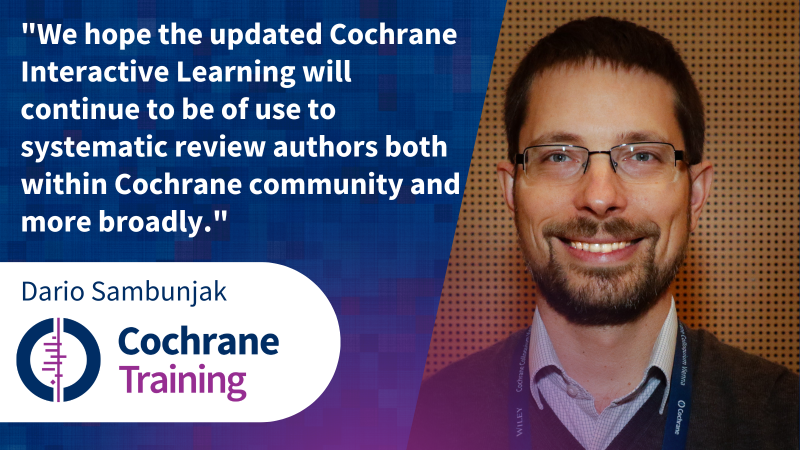In order to be relevant to the needs of users, Cochrane evidence needs to respond to national, regional, and global health priorities. This page provides a round-up of current priority setting activities submitted by Cochrane Groups - updated throughout the month. See the 'Priority Setting' pages of Cochrane Training for additional information on priority setting; including sample documents, FAQs, and case studies.
If you would like to add your prioritization project or activities , please provide the following information to lparsonson@cochrane.org:
Cochrane Group:
URL of Group website:
Twitter Handle:
Title of Priority Setting:
General information: 1-2 sentences explaining what the scope of the priority setting is, any specific methods and/or stakeholders which will be involved.
Target Audience: 1-2 sentences explaining the target audience of your current stage in your priority setting. e.g. general public, health professionals.
Special requests: Optional; Is there anything (with approximate dates) that the Cochrane Central Executive or other Cochrane Groups/Cochrane members could help with? e.g. Disseminating surveys, linking up with stakeholders etc.
End date: What is the date after which input from other Cochrane Groups would be unhelpful? When should your information be updated and moved to completed?
Further information: e.g. Link to priority setting plan on Group website, link to survey.

Cochrane Eyes and Vision
Twitter Handle: @CochraneEyes
Title of Priority Setting: Identifying priority review questions for Cochrane Eyes and Vision
General information: We are conducting a priority setting exercise to assess systematically the nature and extent of research questions relevant to our scope, and to formally incorporate input from a wider range of stakeholders to set priorities for new and updated reviews.
Target Audience: Users of evidence to make health care decisions related to eyes
Special requests: Please dissemiante this survey, suggested tweet to be found here
End date: June 2022
Further information: https://eyes.cochrane.org/news/cochrane-eyes-and-vision-priority-setting-exercise
Cochrane Gynaecological, Neuro-oncology and Orphan Cancers
Title of Priority Setting: Priority Setting Exercise by the Cochrane Gynaecological, Neuro-oncology and Orphan Cancers Group
General information: The priority setting exercise aims to identify ten new priority review titles and ten priority reviews for update within the areas of cervical/vulval, endometrial and ovarian cancer. The results of the exercise will shape the output of the Gynaecological, Neuro-oncology and Orphan Cancers (GNOC) Group to ensure it meets the needs of end-users.
Target Audience: The target audience for this exercise is end-users of GNOC Group evidence. Stakeholders involved in prioritisation will include advocacy groups/ charities, patients and carers, medical colleges and societies, researchers, policy makers and guideline developers.
Special requests: The GNOC group aim to share the main survey (stage 2 in the plan) in September 2021. Links to the survey will be posted on the GNOC Group website and social media. Any help in sharing it would be much appreciated.
End date: The estimated end date for the full exercise is December 2021.
Further information: https://gnoc.cochrane.org/ and Priority Setting Plan
Cochrane Emergency and Critical Care
Title of Priority Setting: Prioritization process for the Emergency and Critical Care Review Group
General information: Our prioritization process aims to support the production of high-quality, clinically relevant reviews, with meaningful impact and utility for clinicians, patients, policymakers and guideline developers by identifying priority topics for new reviews and updates. A steering group will engage external stakeholder groups to solicit topic nominations, and our current catalogue of reviews will be assessed. Eligible titles will then be prioritized through an informal ranking process with input from our editorial board and steering group. The resulting list of priority reviews will be disseminated widely.
Target Audience: Clinicians, clinical societies and associations, patients, policymakers and guideline developers.
End date: As a result of the COVID-19 pandemic, this process has been put on hold as we are currently prioritizing work on COVID-19 related reviews and initiatives. We still plan to release the results of this exercise in 2021.
Further information: Read more about the prioritization process
Cochrane Airways
Title of Priority Setting: Cochrane Airways priority-setting project
General information: A survey and rolling literature surveillance program to gather stakeholder questions. A priority-setting group has been established to develop systematic review questions from the stakeholder questions and select the highest priority review topics. They have completed a Delphi-type process to rank and produce a list of their top 12 uncertainties. These will be worked up into topics for Cochrane Reviews.
Target Audience: The group seeks to prioritise questions/uncertainties submitted in a survey by people living with, or their carers, a respiratory condition such as asthma, COPD, bronchiectasis, sleep apnea, interstitial lung disease or pulmonary hypertension. The group of stakeholders includes patients, carers healthcare professionals and researchers to join our priority-setting advisory group.
Further information: Priority setting plan and report
Cochrane Acute Respiratory Infections
General information: We define priority setting as making informed decisions about review topics to ensure that concepts identified through consultation with health professionals, consumer representatives, and other stakeholders, are met. The purpose of the project was to identify priority topics of interest to our stakeholders for review. We undertook a Delphi survey with stakeholders, research gaps analysis (to determine interventions and health conditions for which there are RCTs not systematically reviewed by Cochrane), and analysed clinicians' searches for ARI-related topics on the Trip database.
Target Audience: Stakeholders included clinicians, representatives of healthcare consumer organisation, academics, and Cochrane members
End date: We completed the planned priority-setting project components. We now plan to undertake further activities in the future as resources permit.
Further information: See our reports and publications relating to the ARI review priority-setting project at our website
Cochrane Hypertension
Title of Priority Setting: Cochrane Hypertension Priority Setting Project
General information: In Phase 1, we mapped existing Cochrane Hypertension review titles to the top ten priorities identified by the Hypertension Canada Priority Setting Partnership Group (HCPSPG), which used the James Lind Alliance priority setting process. Phase 2, a bilingual (English/Spanish) social media engagement campaign (#AskCochraneHTN) to solicit additional priorities from patients and other stakeholders via an online questionnaire is currently underway.
Target Audience: The priority-setting exercises are designed to confirm that we are focussing our efforts on reviews which have been cited by our stakeholders (patients, carers, clinicians, and researchers) as being of the highest importance and that we are compliant with Cochrane requirements for priority-setting.
End Date: TBD
Further information: Our priority setting plan is available in English and Spanish.

Cochrane First Aid
Twitter Handle: @Cochrane_FA
Title of Priority Setting: Prioritization of new topics for first aid-related Cochrane reviews
General information: With our prioritization exercise process, we aimed to generate a list of five priority topics for new Cochrane reviews, that are of interest to our stakeholders (including lay first aid providers and first aid guideline developers).
Target Audience: Lay first aid providers and first aid guideline developers
End date: The exercise is completed. Results are published on the website.
Further information: https://firstaid.cochrane.org/news/prioritization-new-topics-first-aid-related-cochrane-reviews and https://firstaid.cochrane.org/news/priority-exercise-%E2%80%93-input-lmic
Cochrane Bone, Joint and Muscle Trauma Group
General information: We want to find out what people do to reduce their risk of exercise-related injuries and what evidence they would find helpful on injury prevention, to identify priority topics for future systematic reviews. Information will be gathered from two online surveys aimed at (1) sports participants and (2) people providing sports/physical activity support. The results of both surveys will go forward to inform and provide core material for the third stage where we will approach people including subject experts, Cochrane stakeholders and researchers to take part in a Delphi procedure.
Target Audience: We are now at the first stage in our project and are asking people aged over 16 who participate in sports or physical activity to complete an online survey.
End date: Provisionally, the end of the project is 31st March 2021.
Further information: See the webpage for more information and the survey
Cochrane PaPaS
Twitter Handle: @CochranePaPaS
Title of Priority Setting: Adult palliative care
General information: This prioritisation survey aims to identify the most important questions in adult palliative care. The responses will guide our decision making over the next five years as we update existing Cochrane Reviews and identify further questions.
Target Audience: We want to focus our research on questions that are meaningful and important to our stakeholders. The survey is open to everyone with experience and an interest in this area, such as patients and carers; clinicians and health professionals; researchers; charities, groups and organizations; policy makers and guideline developers.
Special requests: Please share with your contacts. Suggested tweets and email templates are available in this dissemination package.
End date: 1 March 2021
Further information: https://www.surveymonkey.co.uk/r/HN6YR5K News item on website
Cochrane Urology
Title of Priority Setting: Priority setting process for Cochrane Urology
Focus: benign conditions of the prostate
General information: For this short prioritisation exercise, we will consult with our editorial base and external stakeholders on which topics we need to update or address with new reviews. This first stage will include a survey to our editors and a second stage will involve a survey to a wide range of stakeholders.
Target Audience: People suffering from benign conditions of the prostate, partners, carers, clinicians, policymakers, guideline developers and professional and consumer organisations, among others.
Special Request: Help disseminate survey by social media or targeted emails. We also welcome you to suggest key stakeholders that we should contact.
Suggested tweet: The @CochraneUrology Group has launched a prioritisation survey to identify the most important questions related to benign conditions of the prostate. Submit your responses here by 30 April: https://buff.ly/3vQ44ae #LUTS #BPE #BPH #UrologyPriorities
Suggested tweet: If you are an individual who has been affected by a #prostatic disease, a carer, health professional, guideline developer, researcher, policymaker or part of an advocacy group, @CochraneUrology would like to hear what review topics are important to you! https://buff.ly/3vQ44ae
End date: April 2021
Further information: Our full plan can be found on our website (https://urology.cochrane.org/news/cochrane-urology-review-group-priority-setting). We will disseminate the survey to external stakeholders once we finalise the first stage.
Cochrane Pregnancy and Childbirth
Title of Priority Setting: Stakeholder prioritisation 2020
General information: For this short prioritisation exercise, we have compiled a shortlist of 29 existing Cochrane Reviews (published between 2002 and 2020) that have been cited in NICE guidelines in the last two years. We would like to identify the most important reviews for updating within the next two years.
Further information: Priority setting survey can be accessed here.
Cochrane Neuromuscular Update
Title of Priority Setting: Neuromuscular priority setting
General information: This new priority setting exercise will identify 20 to 30 reviews to be the main focus of our work over the next three years. The process will help us to identify priorities for updating published reviews and completing ongoing reviews, as well as identifying any gaps where new reviews are needed.
Target Audience: Having surveyed our Editorial Board and the Neuromuscular Academic Advisory Group of the Association of British Neurologists, we are now in consultation with consumer stakeholder groups
End date: We aim to publish the implementation plan for our priority reviews shortly.
Further information: Priority setting plan on the Cochrane Neuromuscular Group website
Cochrane Incontinence
Title of Priority Setting: Priority setting for faecal incontinence
General information: We carried out a priority-setting exercise to identify the top priority areas for research into faecal incontinence. Using robust methodology, we assessed research gaps by identifying existing systematic reviews and upcoming clinical trials. We asked stakeholders to complete a survey to give their expertise and tell us which areas they consider to be a priority. The results from these three streams were collated, and an evidence gap map was developed. We used the evidence map to facilitate knowledge transfer during an online workshop attended by carefully selected participants. The workshop was designed to refine and rank the priority areas and explore what was important to patients in more detail. The results have been written into a report and can be found on the Cochrane website which is linked below. Over the next 12 months and beyond, the Cochrane Incontinence group will prioritise and develop review questions on faecal incontinence according to the findings of this exercise.
Target Audience: Adults with experience in managing and/or living with faecal incontinence, clinicians, societies, advocacy groups, policymakers and guideline developers.
End date: This project is complete
Further information: Read more about the prioritisation work on the Cochrane Incontinence website.
Abdomen and Endocrine Network in collaboration with the Public Health and Health Systems Network and the Nutrition Field
Title of Priority Setting: Obesity Gap Analysis and Prioritisation (OGAP) Project
General information: Our aim is to identify the ‘top ten’ research priorities in the field of obesity that are the most important for stakeholders. Our specific objectives are to identify gaps in the Cochrane Library by comparing existing titles to research needs identified in clinical guidelines, and to consult with stakeholders to prioritise these gaps.
UPDATE! The OGAP Project is now complete and results will be published shortly. For further information, please contact rrichardson@cochrane.org. In the meantime, we would like to thank all the expert stakeholders who contributed to the prioritisation exercise:
Alejandro Gonzalez, Amanda Adegboye, Anel Schoonees, Annalijn Conklin, Anne Martin, Bernd Richter, Boyd Swinburn, Brittani Beavis, Catherine Marshall, Cindy Farquhar, Cintia Curioni, Claudio Maffeis, David Broom, Elaine Rush, Elizabeth Sturgiss, Emily Belarmino, Giuliana Valerio, Jeffrey Hamdorf, Kate Berridge, Laura Anderson, Louise Baur, Maria-Inti Metzendorf, Maureen Dobbins, Michael Jensen, Paula Brauer, Peter von Philipsborn, Sarika Paul, Shane Nugent, Simon Bacon, Soana Muimuiheata, Sue Curry, Susan de Jersey, Zeinab Hosseini and three further experts who chose to contribute anonymously.
Cochrane Rehabilitation
Title of Priority Setting: Cochrane Rehabilitation Prioritisation Exercise
General information: In collaboration with 41 national Physical and Rehabilitation Medicine societies and 100 health professionals (9 different professions) coming from 39 countries, Cochrane Rehabilitation Prioritisation Exercise aims to identify the current research gaps in rehabilitation-relevant Cochrane Systematic Reviews production and to define the priorities for research among these gaps. The project included five Delphi Rounds: the first three aimed to modify and approve the Cochrane Rehabilitation Ebook Index, which was the external reference framework the project started from, while the last two aimed to identify research priorities according to the existing Cochrane evidence.
Target Audience: clinicians, researchers, rehabilitation stakeholders
End date: The exercise is completed and the results will be published soon.
Further information: https://rehabilitation.cochrane.org/special-projects/prioritization
Cochrane Haematology
Title of Priority Setting: Priority Setting Exercise for Cochrane Haematology Reviews
General information: Our aim is to identify a list of 5 new priority Cochrane review titles and 10 priority Cochrane review titles that need updating in the area of Haematology. Stage one of the priority setting exercise involved forming a list of potential priority topics, including reviews to be updated and new review titles. In stage two of the project these priority update and new review topics were collated into two lists to be circulated to a broader community of external stakeholders in a survey. Respondents prompted to rank your top topics for review updates and new reviews from the lists provided.
Further information: Priority setting plan and dissemination flyer
Epilepsy and Movement Disorders
URL of Group website: epilepsy.cochrane.org mdg.cochrane.org
Twitter Handle: @CochraneEpileps @CochraneMDG
Title of Priority Setting: Cochrane Epilepsy Group and Cochrane Movement Disorders prioritisation exercise undertaken as part of the following programme grant, ‘Clinically effective treatments for central nervous system disorders in the NHS, with a focus on epilepsy and Movement Disorders’.
General information: The Liverpool Reviews and Implementation Group (LRiG) developed, on behalf of the Cochrane Epilepsy Group and the Cochrane Movement Disorders Group, a set of online priority setting and topic refinement questionnaires, with invitations sent to 8,000 Epilepsy Action and 4,500 Parkinson’s UK research network members. LRiG co-ordinated social media promotion of the surveys via stakeholders including the core Cochrane network. The surveys gathered views of over 1,000 respondents (largely UK-based) and provided both clear quantitative priorities and rich descriptive reasons for choosing priority topics.
Target Audience: Patients, healthcare professionals, carers
Further information: Final write up of the exercise and dissemination plan is in progress.
Cochrane Multiple Sclerosis and Rare Diseases of the CNS
URL of Group website: https://msrdcns.cochrane.org/
Title of Priority Setting: International Survey on Research Priorities for Cochrane Systematic Reviews on Multiple Sclerosis
General information: This is a wide-ranging consultation process aiming to choose new topics for our Cochrane Reviews, and to make sure they would be as useful as possible to the people who need to use, or might be affected by our research: people with MS and their carers, health professionals, researchers and the wider community.
Target Audience: We asked people with MS and their carers, health professionals, researchers and the wider community to share their priorities
End date: The entire process completed in 2021.
Further information: Link to information page on priority setting
Cochrane Anaesthesia
Title of Priority Setting: Prioritization process for the Anaesthesia Review Group (CARG)
General information: Our prioritization process aims to support the production of high-quality, clinically relevant reviews, with meaningful impact and utility for clinicians, patients, policy makers and guideline developers by identifying priority topics for new reviews and updates. A steering group will engage external stakeholder groups to solicit topic nominations which will then be prioritized through a modified Delphi exercise. The resulting list of priority reviews will be disseminated widely and interim results are expected by August 2020.
Target Audience: Clinicians, clinical societies and associations, patients, policy makers and guideline developers.
Further information: Read more about the prioritization process.
End date: Autumn 2020. Results now available. Work on priority reviews will commence in early 2021.
Cochrane Breast Cancer
Title of Priority Setting: Prioritising breast cancer topics
General Information: In one form or another, we all seem to innately prioritise tasks based on resources (i.e. time, finances, etc.). One of Cochrane’s goals is to prioritise review topics based on a formal prioritisation process, with the aim being that the most relevant and useful reviews are available to its readers. This year, the Cochrane Breast Cancer Group plans to prioritise the breast cancer review topics that will be developed or updated in the Cochrane Library.
Target Audience: Individuals, medical colleges or societies, advocacy groups, and other key breast cancer organisations.
End Date: 30 November 2019.
Cochrane Cystic Fibrosis and Genetic Disorders
Title of Priority Setting: James Lind Alliance Priority Setting Partnership in CF
General information: We carried out a James Lind Alliance Priority Setting Partnership in CF and together with people living and working with CF identified the top ten priorities for research into CF. These research questions generated new review titles on our priority titles list. A final survey to test applicability and acceptability of the more defined research questions has recently launched.
Target Audience: We included people with CF, parents of children with CF, other family and healthcare professionals both on our steering group and in our surveys. The aim was to feedback what we found to the CF community and to work with stakeholders and funders to promote further research in the areas that are clinically relevant to the CF community. The results of this process influenced our Cochrane priority titles list to ensure that future reviews are those of most importance.
End date: September/October 2019 with publications and dissemination back to the CF community to follow.
Further information: Read more about the prioritization setting work.
Cochrane Ear, Nose and Throat
Title of Priority Setting: Priority setting exercises for balance problems and otitis media with effusion (glue ear)
General information: Building on the success of recent prioritisation projects for chronic rhinosinusitis and chronic otitis media, we are carrying out two new scoping exercises for otitis media with effusion (glue ear), and ENT aspects of balance disorders (including Mèniere’s disorder and benign paroxysmal positional vertigo). Over the next two months, we will set up a small prioritisation group for each topic and undertake a short exercise to identify the most important issues for every aspect of the research questions, including populations, interventions and outcomes.
Target Audience: health care professionals, clinical societies and associations, individuals with experience of balance problems or glue ear and their families.
End date: January 2020.
Further information: Scoping - balance disorders and otitis media with effusion (OME, 'glue ear')
Cochrane Oral Health
Title of Priority Setting: Cochrane Oral Health Priority Setting Project
General information: Cochrane Oral Health is looking for important questions to answer in taking care of the mouth, teeth and gums. We are looking at systematic reviews that we've already published over the past 20 years to see which should be updated, and we are also looking at new questions that may need to be answered.
Target Audience: The next phase in our priority setting process will target specific stakeholders, who are invited by the group to take part. These will include guideline developers, clinicians, researchers and consumer representatives.
End date: February 2020
Further information: All the information about our process (including our priority setting plan and reports on various phases) can be found here on our website. We are also sending out periodic priority setting bulletins, you can sign up to receive them here and catch up with previous issues here.
Cochrane PaPaS
Title of Priority Setting: PaPaS priority setting project 2019
General information: Our review group has a broad scope and we produce reviews on acute and chronic pain, headache and migraine, and palliative and supportive care. We are embarking on a prioritisation exercise to evaluate the scope, coverage, and potential gaps in our portfolio to meet the objectives of the new MOSS Network Strategic Plan and the ongoing aims of Cochrane’s Strategy to 2020. We are following the mandatory standards detailed in the Knowledge Translation guidance.
Target Audience: Once we have identified our priority topics, we will circulate surveys with relevant stakeholders (e.g. organisations, charities, patient groups, and any other relevant individuals or groups) to gather their feedback on the conditions, interventions and populations we need to focus on over the next five years.
End date: Jan 2020
Further information: Find out more about our prioritisation plans for 2019 and beyond.
Cochrane Public Health
Title of Priority Setting: Cochrane Public Health (CPH) Review Prioritisation Process
General information: Our aim of the review prioritisation process is to determine the priorities of Cochrane Public Health (CPH) in order to: direct potential resource expenditure to existing incomplete reviews, updates and planned reviews; decide whether inactive incomplete reviews should be retained; and develop new priority topics. By engaging potential stakeholders in this process, we endeavour to produce reviews that are highly relevant to policy and practice.
Target Audience: All CPH stakeholders, including funders of reviews, guideline developers and stakeholders who translate review findings to inform and impact policy and practice.
End Date: February 2020
Further information: Information regarding the CPH review prioritisation process can be found on the CPH website here: https://ph.cochrane.org/resourcesinfo/topic-prioritisation-process
Cochrane Skin
Title of Priority Setting: Cochrane Skin Prioritisation of Systematic Reviews 2020
General information: We aim to review our existing portfolio, consider gaps and add new review questions.
Target Audience: Clinicians, clinical societies and associations, patients, policy makers and guideline developers.
Suggested Tweet: Dermatology community! Please help decide the priority topics for Cochrane Skin reviews! Carers, patients,
End date: January 2020
Further information: More info https://skin.cochrane.org/prioritisation
If you would like to add your prioritization project, please provide the following information to lparsonson@cochrane.org:
Cochrane Group:
URL of Group website:
Twitter Handle:
Title of Priority Setting:
General information: 1-2 sentences explaining what the scope of the priority setting is, any specific methods and/or stakeholders which will be involved.
Target Audience: 1-2 sentences explaining the target audience of your current stage in your priority setting. e.g. general public, health professionals.
Special requests: Optional; Is there anything (with approximate dates) that the Cochrane Central Executive or other Cochrane Groups/Cochrane members could help with? e.g. Disseminating surveys, linking up with stakeholders etc.
End date: What is the date after which input from other Cochrane Groups would be unhelpful? When should your information be updated and moved to completed?
Further information: e.g. Link to priority setting plan on Group website, link to survey.




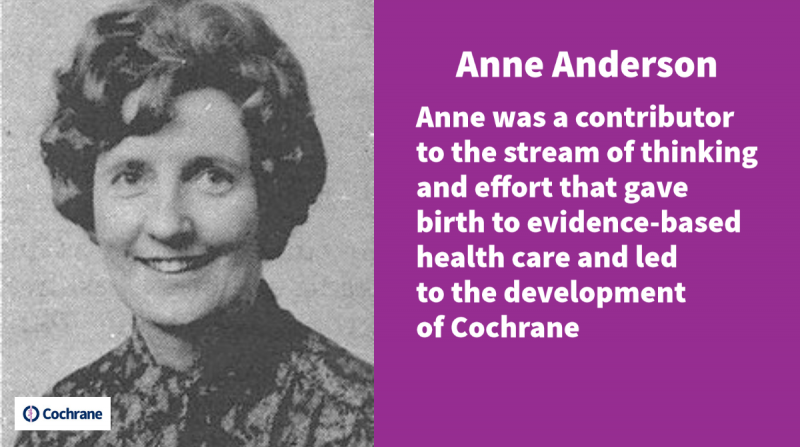 What’s the goal of the Anne Anderson Award?
What’s the goal of the Anne Anderson Award?



